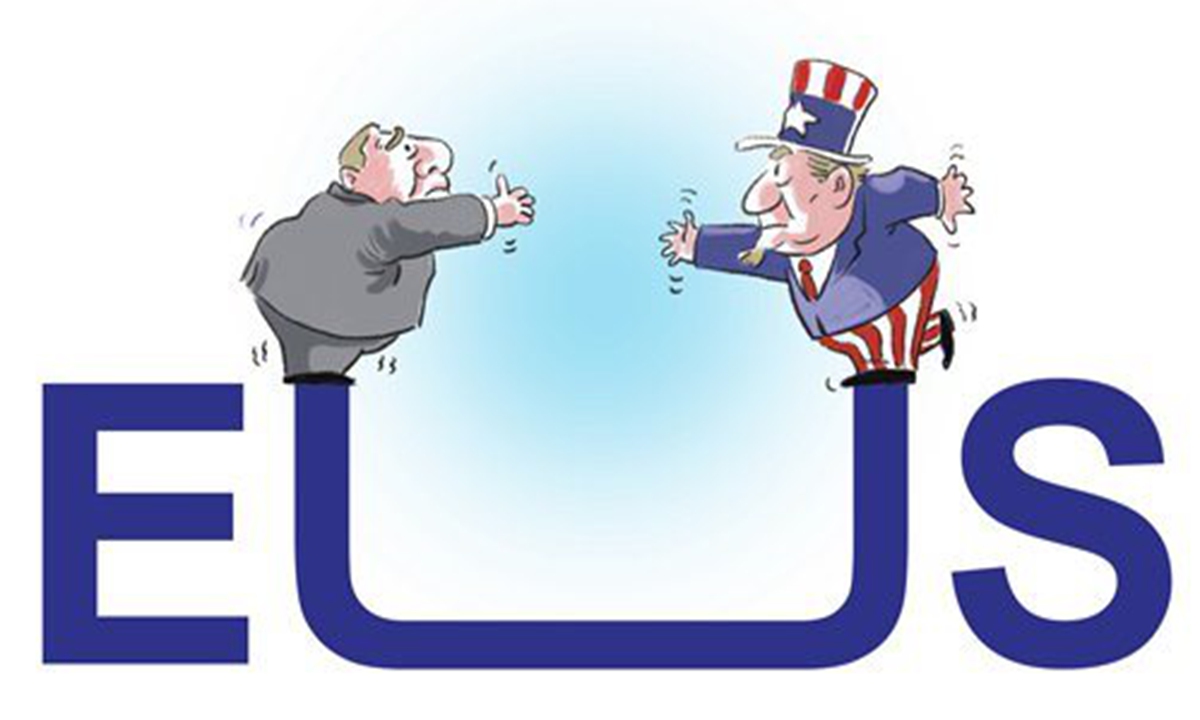Europe unwilling to take sides between China and the US
Source: Global Times Published: 2020/7/22 21:13:40

Illustration: Liu Rui/GT
US Secretary of State Mike Pompeo paid a flying visit to the UK and Denmark from Monday to Wednesday to discuss issues including China.
The main aim of Pompeo's visit is to unite European countries to deal with China's rise. Robert O'Brien, President Donald Trump's national security advisor, also visited Europe earlier this month, talking with European officials about China and other foreign policy issues. Constructing an anti-China alliance with European countries seems to be the Trump administration's primary purpose.
However, it will be difficult for the US to build an anti-China bloc in Europe. European countries are reluctant to see the world split into two opposing camps because of a China-US confrontation, which is similar to the Cold War standoff between the US and the Soviet Union.
Only when Europe and the US have a common foe will Europe then join the US camp to confront it. For example, in the Cold War era, European countries regarded the Soviet Union as their enemy. They founded the NATO with the US to cope with the threat posed by the Soviet Union.
But currently, not treating China as its foe, Europe is not likely to establish an anti-China group with the US. This is only Trump's wishful thinking.
Furthermore, European countries have different interests. Some move closer to Washington, while some are intimate with Beijing. It is hard for them to form a common policy toward China. At this stage, European countries will not echo the US' chorus that China is a common enemy of the West.
Britain's recent rhetoric and moves against China on issues such as Huawei and the national security legislation for Hong Kong seem to be consistent with those of the US. In the post-Brexit era, the UK cannot take advantage of the European single market any longer. It has to develop its economy on its own. As a result, London hopes to develop a closer relationship with both Beijing and Washington, the two largest economies in the world.
In recent times, the US has mounted more pressure on the UK and forced it to pick a side. As a close ally of the US, the UK has to retain their alliance. It was also propelled to echo with the US on the Huawei issue, although it has had to make enormous economic sacrifices and risks a tense relationship with China.
China is not what it was a couple of decades ago. China is the world's second largest economy and its marketing keeps expanding. The UK is well aware of this.
The UK and other European countries do not wish to takes sides between China and the US. They do not want to be forced to take on the US chariot. European countries have been talking about strategic autonomy, and hope to have more room amid major power competition.
China should understand that Europe and US' allies have closer relations on a spectrum of areas such as economy, security, ideology and values. Some European countries believe their security interests rely on the US, so they tend to be closer to the Washington Consensus. But it does not necessarily mean their relations with China have to be sour. They need to develop ties with China for the sake of economic interests. And China should seek this opportunity to maintain cooperation with most European countries.
China needn't worry too much about US wooing Europe. Cooperation still dominates China-Europe relations, and the two sides are partners in regards to global governance and promotion of multilateralism. Policymakers in Europe will try to retain favorable relations with the US, but they will not sacrifice their friendly relations with China.
The article was compiled by Global Times reporter Lu Yuanzhi based on an interview with Feng Zhongping, vice president of the China Institutes of Contemporary International Relations. opinion@globaltimes.com.cn
Posted in: VIEWPOINT